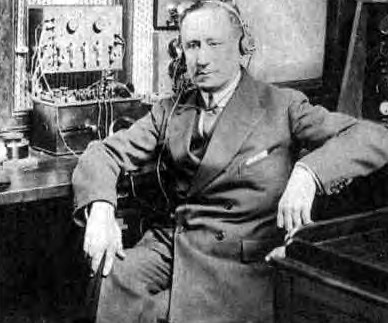Marconi wanted to talk to Martians, and who wouldn’t?
Was just reading “Building a Language to Communicate With Extraterrestrials,” Daniel Oberhaus’ smart Atlantic piece about scientists trying to develop a cosmic lingua franca, and it reminded me of a Dennis Overbye NYT article from early in the Aughts. In that piece, Overbye profiled Dr. Douglas Vakoch, the young “Interstellar Message Group Leader” at the SETI Institute, who was then just starting his career, hopeful we would someday make intelligible contact. Vakoch, who was interviewed two years ago at the New Yorker site, maintains hope, though he knows there are no guarantees.
Overbye’s opening:
PHILADELPHIA— There is probably only one person on earth although, one hopes, not in the universe — whose business card identifies him as ”Interstellar Message Group Leader.”
That would be Dr. Douglas Vakoch, aspiring psychotherapist, philosopher, self-described exo-semiotician, and resident psychologist at the SETI Institute in Mountain View, Calif., which is dedicated to the search for extraterrestrial intelligence. It is his job to come with ideas for a response in case any searchers ever discern, amid the crackle and hiss of radio waves from outer space, the equivalent of a ”Hi there — what’s your name?”
It was the search for a suitable answer that found Dr. Vakoch, standing on a lonely sidewalk here late one chilly evening looking for the back way into a brick building. He was in town to attend and discuss a new play about an outer space organism that turns people’s skins green, and to give a talk about the problems of composing interstellar interspecies messages.
In between, he was hoping to squeeze in a visit to a meeting of Alcoholics Anonymous, a homework assignment for getting a license to practice psychotherapy in California, his home state, but the building was locked. Of course, as a SETI researcher, Dr. Vakoch knows that frustration is part of the process.
The receipt of a signal from another civilization, astronomers involved in SETI say, would be one of the greatest events in the history of humanity. The question of how or whether to respond, they say, is too important to be left to the last minute.
”The initial message we send, if we ever do send any, would create the first impression for what would be a dialogue that would be occurring over many generations,” Dr. Vakoch said.
In the interest of making a good impression, and perhaps counteracting the burble of Survivor, automobile ads and political news spreading outward through the galaxy on radio and television waves, Dr. Vakoch is using a grant from the John Templeton Foundation to devise a message that encodes the notion of altruism, which many biologists and humanists would like to think is a pillar of any civilization.
It is an effort, he says, that will have value even if there is nothing but silence from the heavens. ”By thinking about who we would want to represent ourselves, we’re forced to reflect in a different way than we usually do about what our deepest values are,” Dr. Vakoch said.
”And by attempting to put some of the ideas and values most important to us in an abstract universal language, we’re forced to clarify what we mean by those things.”•

